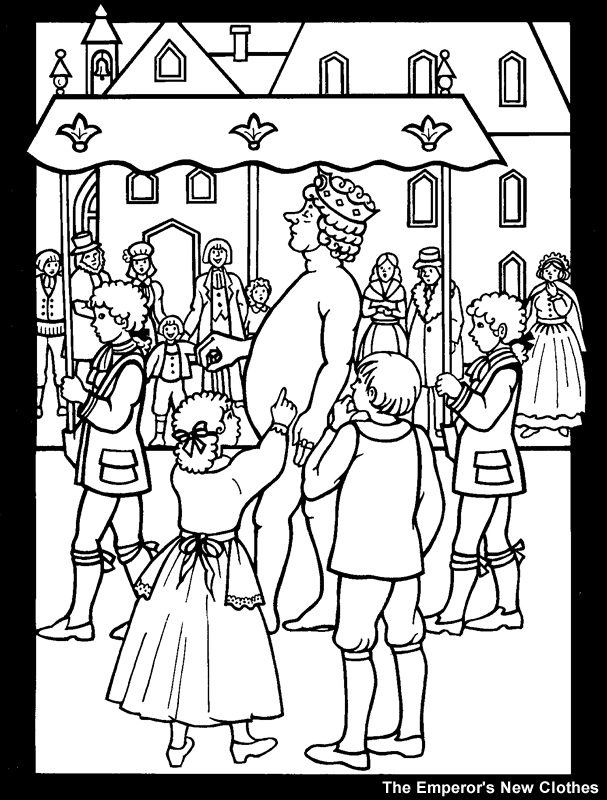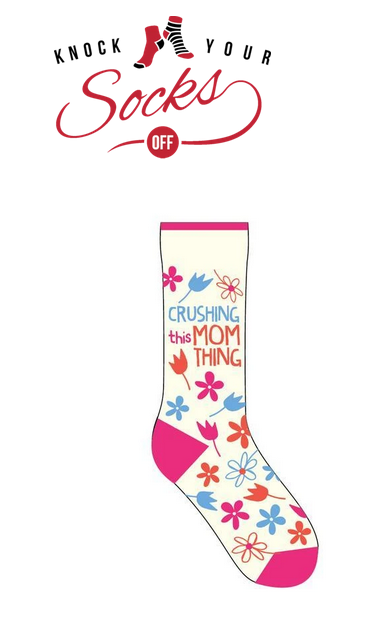From Hats to Boots - 25 Fun Idioms in English
 Recently I again came across Hans Christian Andersen's tale “The Emperor's New Clothes”. (image from Hans Christian Andersen Fairy Tales Stained Glass Coloring Book, Image courtesy of Dover Publications)
Recently I again came across Hans Christian Andersen's tale “The Emperor's New Clothes”. (image from Hans Christian Andersen Fairy Tales Stained Glass Coloring Book, Image courtesy of Dover Publications)
Those of you who grew up with fairy tales will know the story: Two scoundrels claim to fit the emperor with imaginary new clothes. They say that the clothes would be invisible to all who are stupid and incompetent.
His subjects of course pretend not to see that the emperor is indeed naked as he proudly walks through the city. It takes a child to say what everybody can see but is afraid to acknowledge:
“But he hasn't got any clothes on!”
The proverb "clothes make the man" is well known, and the English language is full of idioms that involve different items of clothing. Because idioms in a language don't mean what the individual words say, they can be confusing and challenging to non-native speakers.
Here are 25 idioms in English that all involve clothing items.
1. Idiom: Talking through your hat
Meaning: Saying things that are absurd or not supported in any way. Talking about something without understanding what you're talking about.
Sentence: My brother tried to explain how a computer works. But if you ask me, he was talking through his hat. None of what he said made any sense.
(Photo by Max Anderson on Unsplash)
2. Idiom: Eating one's hat
Meaning: Expressing disbelief that something is true or will actually happen.
Sentence: If you really finish your homework today, I'll eat my hat.
3. Idiom: Something is old hat
Meaning: This means that an object, a film, a story, a phrase, etc., is outdated, old-fashioned, too familiar because it's been used frequently.
Sentence: That kind of story is old hat. I've heard it lots of times before.
4. Idiom: A feather in one's cap
Meaning: An achievement one can be proud of.
Explanation: The idiom may go back to the custom of a hunter putting the feather of a successfully slain a bird in his hat.
Sentence: Her promotion to manager is definitely a feather in her cap.
 5. Idiom: Having a nightcap
5. Idiom: Having a nightcap
Meaning: Having a drink at the end of the day or the end of a party.
Explanation: In earlier times, a "night cap" was actually a cap you put on before going to bed.
Sentence: This was a perfect day. Let's have a nightcap to round it off. (Photo by Thomas Park on Unsplash)
6. Idiom: Ride on somebody's coattails
Meaning: Doing something by being associated with someone else.
Explanation: "Coattails" are the flaps at the lower part of a formal tailcoat which is long in the back and shorter in the front. Riding on someone's coattails evokes the image of a person standing on those long back flaps.
Sentence: He got that important post by riding on the senator's coattails.
7. Idiom: Handle someone with kid gloves
Meaning: To be very careful and tactful when dealing with someone.
Explanation: A "kid" here is a young goat, so kid gloves are made of very soft leather.
Sentence: I have to be careful to handle my friend Alison with kid gloves. She gets offended easily.
8. Idiom: The gloves are off
Meaning: People are ready to fight or argue more aggressively.
Explanation: This expression probably comes from boxing, where gloves are supposed to cut down on the damage fighters do to each other. It also suggests the idea that a man would take his gloves off to get ready for a violent confrontation.
Sentence: What you said was really hurtful. As far as I'm concerned, the gloves are now off. (Photo by NeONBRAND on Unsplash)
9. Idiom: Keep your shirt on
Meaning: Stay calm, don't become impatient or angry.
Sentence: Please keep your shirt on, I'm sure we'll get there in time. I can't drive any faster.
10. Idiom: Lose one's shirt
Meaning: To lose a large amount of money or one's possessions.
Sentence: I put all my money into that investment, but unfortunately I lost my shirt.
11. Idiom: Have something up one's sleeve
Meaning: To have a secret scheme or plan of action. To have something in reserve that you can use if you need it.
Explanation: The idiom evokes a magician who can pull things out of a hat or coat to surprise his audience. It may also refer to a card player who has hidden a favorable card up his sleeve.
Sentence: Even if this plan doesn't work out for her, I'm sure she has a few other ideas up her sleeve.
12. Idiom: Wear your heart on your sleeve
Meaning: To allow your feelings to show.
Explanation: The expression dates back to jousting during the Middle Ages, where a knight wore the colors of his lady on his sleeve.
Sentence: Ralph wears his heart on his sleeve. It's easy to see when he's upset.
 13. Idiom: Do something off the cuff
13. Idiom: Do something off the cuff
Meaning: Doing something spontaneously, without preparation.
Explanation: The cuff on a shirt is the band at the end of a sleeve. "Off the cuff" suggests reading a few words that were quickly put there as a reminder.
Sentence: I didn't have time to prepare a speech, so I said a few words off the cuff.
14. Idiom: Fly by the seat of your pants
Meaning: Do something using just guesswork or experience. Decide on the course of action as you go along.
Explanation: The idiom goes back to the early days of aviation, when planes did not have instruments to aid in navigation and communication.
Sentence: My boss put me on a project that I knew little about. For the first couple of weeks I was flying by the seat of my pants.
15. Idiom: Beat the pants off someone
Meaning: To show yourself to be much better than someone else. Decisively defeat someone in a competition.
Sentence: Our team beat the pants off our old rivals in yesterday's soccer game.
16. Idiom: Get something under your belt
Meaning: Getting experience that is important and useful.
Sentence: Once you get a few weeks of teaching under your belt, you'll feel more comfortable standing in front of the classroom. (Photo by Asiya Kiev on Unsplash)
17. Idiom: Hit someone below the belt
Meaning: Do something unfair to someone.
Explanation: This term comes from boxing, where it's against the rules to target someone below the waist.
Sentence: What you said was unfair and insulting. It really hit below the belt.
18. Idiom: Be in someone's pocket
Meaning: To be willing to do whatever a person says, especially out of weakness, for money, for personal gain, etc.
Sentence: The judge in the case was in the president's pocket.
19. Idiom: Line one's pockets
Meaning: To make a large amount of money, especially is dishonest ways.
Explanation: Lining something, means to cover it. So this idiom could well refer to putting money in your pockets. A similar expression would be "to feather one's nest".
Sentence: We were shocked to hear that our mayor was arrested for lining his pockets.
20. Idiom: Pull one's socks up
Meaning: To make a determined effort to achieve a target, to improve one's work, etc.
Sentence: This phrase originated in competitive running. At the start of a race, the runners would pull up their socks to get ready for the effort ahead.
 21. Idiom: Knock someone's socks off
21. Idiom: Knock someone's socks off
Meaning: To have a strong positive effect on someone, by impressing or surprising them.
Sentence: Her speech knocked my socks off. It was inspiring and right on. (Picture courtesy of Knock Your Socks Off)
22. Idiom: Wait for the other shoe to drop
Meaning: To wait for an expected (negative) event or consequence.
Sentence: I lost my job and now I'm waiting for the other shoe to drop. I may have to move out of my apartment too.
23. Idiom: Do something on a shoestring
Meaning: To do something using a very small amount of money.
Explanation: A shoestring is a shoelace, i.e. something that costs very little money. So, the expression means doing something or getting by with very little money.
Sentence: That's a really good film. But did you know that it was made on a shoestring?
24. Idiom: Get the boot
Meaning: To be fired from a job.
Explanation: Getting the boot literally means getting kicked out of a place.
Sentence: When the boss found out that my colleague was feathering her nest, she got the boot.
25. Idiom: Pull yourself up by your own bootstraps
Meaning: To achieve success through one's own efforts.
Explanation: A "bootstrap" is a "loop sewn on top or each side of a boot to make it easier to pull the boot on". According to the site Useless Etymology: The phrase “pull yourself up by your bootstraps” originated shortly before the turn of the 20th century. It’s attributed to a late-1800s physics schoolbook that contained the example question “Why can not a man lift himself by pulling up on his bootstraps?” First it was meant to be sarcastic, later it started to imply that it's something one should be able to do.
Sentence: As nobody was around to help him, he had to pull himself himself up by his own bootstraps.
English is the fifth language that you can play to learn on this site, but primarily as "English for Spanish Speakers" and with a few games for "English ESL".
To look for more idioms in English, or get more explanations and examples of the ones above, you can start with these sites: The Idioms, Writing Explained, The Grammarist. But there are many more other sites, just search for "idioms".

